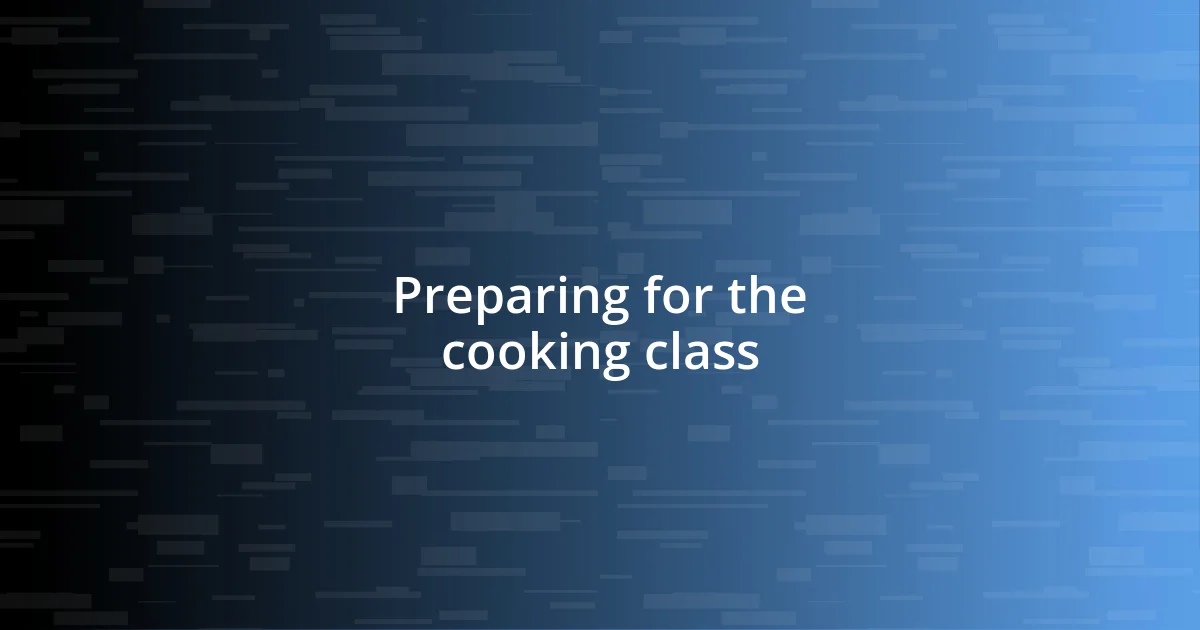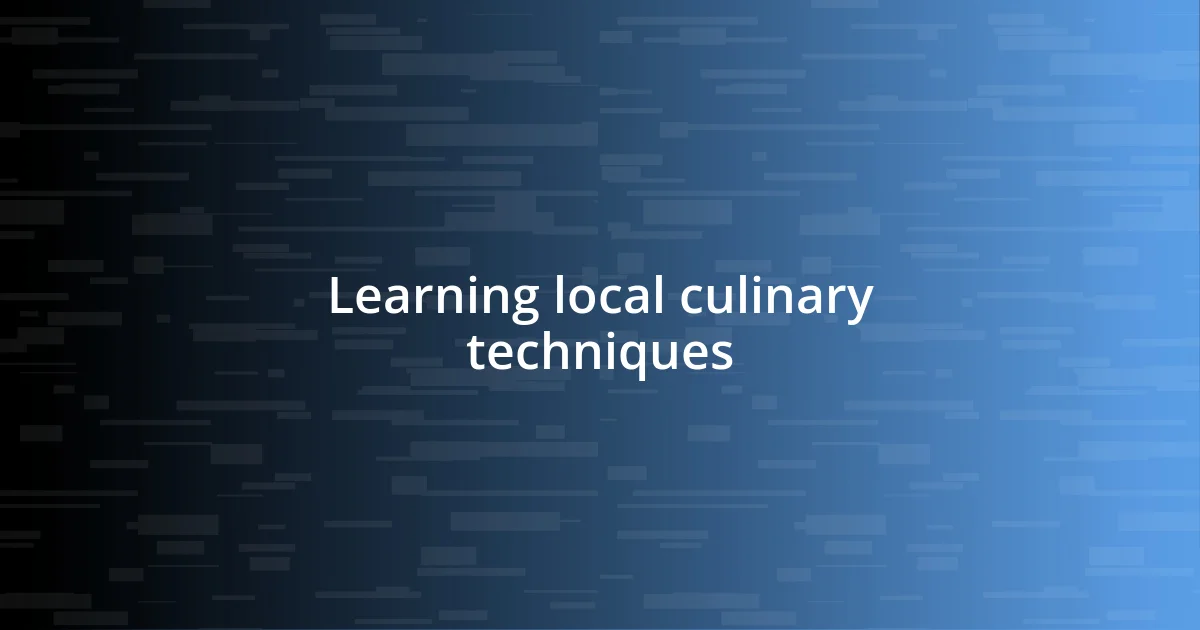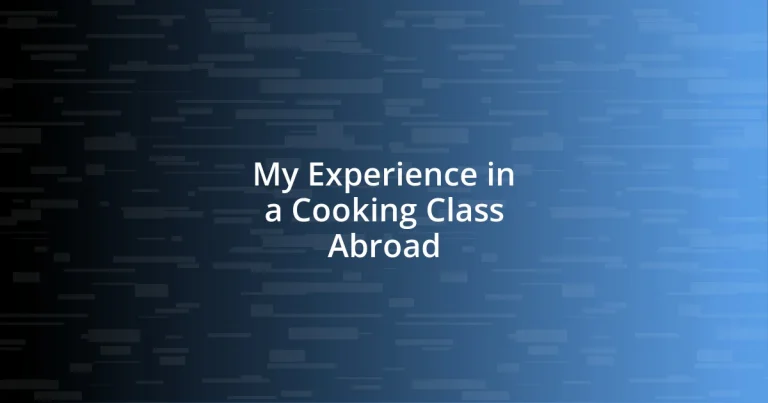Key takeaways:
- Choosing the right destination enhances the cooking experience by connecting with local cuisine and culture, as seen in classes in Italy, Japan, and Thailand.
- Finding the perfect cooking class involves assessing instructor expertise, class size, focus, hands-on learning opportunities, and cultural immersion.
- Engaging with local markets and sharing experiences with instructors deepens appreciation for food, fosters connections, and enriches the culinary journey.

Preparing for the cooking class
Preparing for the cooking class felt like a blend of excitement and nervousness. I vividly remember standing in front of my open suitcase, pondering which spices and utensils to bring along. Should I take my favorite chef’s knife? It felt daunting to think I might be competing with local chefs wielding tools I had never seen before.
The night before the class, I couldn’t help but feel a rush of adrenaline. I laid out my clothes, making sure to pack an apron that had seen many culinary adventures. I wanted to feel like a chef in the kitchen, but I also wondered—would my familiar attire make me overly confident? Mixing that thrill with a hint of apprehension was the perfect cocktail to prepare me for a day of learning.
As I walked into the bustling kitchen, the aroma of fresh ingredients enveloped me, and my heart raced with anticipation. I remember my fingers trembling slightly as I introduced myself to the instructor and fellow students. Did they sense my eagerness? I quickly realized that every one of us was there to learn, making the atmosphere inviting and supportive—a crucial aspect of any successful cooking class.

Choosing the right destination
Choosing the right destination for a cooking class can significantly enhance your culinary journey. Ideally, you want a place that resonates with your interests—whether it’s a rustic Italian villa or the street food scene in Thailand. For instance, I found my heart in a tiny kitchen in Barcelona, where the vibrant energy of tapas preparing matched my appetite for adventure.
It’s essential to consider the local cuisine and cultural background of your chosen location. Think about what ingredients excite you and how they can influence your cooking style. When I enrolled in a seafood class in Japan, I was not only learning how to prepare sushi but also understanding the intricate relationship between the Japanese culture and their cuisine. This deepened my appreciation for every dish I served.
Lastly, don’t underestimate the value of connecting with the local chefs. I remember chatting with a chef in Tuscany, who passionately shared stories behind each regional dish, sparking my own creativity. It’s not just about learning recipes; it’s about understanding the soul of the food you create. That personal connection can make your experience unforgettable.
| Destination | Key Feature |
|---|---|
| Italy | Tuscany’s authentic culinary heritage |
| Japan | Deep cultural insights through local cuisine |
| Thailand | Exciting street food experience |

Finding the perfect cooking class
Finding the perfect cooking class involves more than just picking a location; it’s about aligning your passions with the instruction provided. During my search, I stumbled upon a class that promised hands-on experience with traditional French pastry making. The warm, inviting reviews from previous attendees made me feel like I was already stepping into a family kitchen. It was exciting to imagine mastering the delicate art of croissant folding while surrounded by fellow enthusiasts.
Here are some key factors to consider:
- Instructor Expertise: Look for classes taught by chefs with impressive backgrounds. Their skills can elevate your learning experience.
- Class Size: Opt for smaller classes for more personalized attention. I found that in my class of just six, it felt intimate, allowing many one-on-one moments with the instructor.
- Class Focus: Whether you want to explore baking, vegetarian dishes, or regional specialties, ensure the class matches your culinary interests. I chose a class emphasizing local ingredients, connecting each dish to the beautiful landscape around me.
- Hands-On Learning: Practical experience is invaluable. I loved that we got to create every dish from scratch, which made the learning process more engaging and memorable.
- Cultural Immersion: Find a class that offers insights into the local food culture. It’s not just about recipes; it’s about the stories and traditions behind them. I left my pastry class not just with skills but with a genuine appreciation for the role of pastries in French culture.

What to expect in class
When you step into a cooking class abroad, expect a lively atmosphere filled with the scent of fresh ingredients. I remember the first time I walked into a bustling kitchen in a Lisbon market. The energy was palpable, as chefs and students eagerly chopped vegetables and stirred pots. You really feel like part of a culinary family, and it ignites your excitement for what’s to come.
Hands-on learning is a hallmark of these classes, which is one of the aspects I found most rewarding. You aren’t merely a spectator; you’re engaging with the ingredients. In my class in Thailand, we not only cooked but explored the market to choose our produce. That connection made the dishes come alive, as I could taste the freshness in every bite. Isn’t it fascinating how food brings people together, transforming strangers into fellow culinary adventurers?
Moreover, you’ll gain insights that go beyond the recipes. I remember one chef sharing the history behind paella in Spain, weaving tales that deepened my appreciation for the dish. Understanding the cultural significance of what you’re cooking truly enriches the experience. It made me wonder—how often do we eat without considering the stories our meals tell? By the end of each class, I found myself not just a better cook, but also a more thoughtful eater.

Learning local culinary techniques
Learning local culinary techniques in a cooking class abroad is like uncovering hidden treasures. I distinctly remember carefully crafting homemade pasta in a cozy Italian kitchen. The chef’s hands moved with such grace as he demonstrated the perfect technique for rolling dough. I found myself mesmerized, realizing that mastering this simple skill could open up a world of flavors. Have you ever tried to make pasta from scratch? The texture and taste are simply incomparable to store-bought.
As we delved deeper into the class, I encountered the concept of “toasting” spices to bring out their true essence. I never considered the transformative power of this small step until it was shown to me. When I added garlic and spices to the hot oil, the aroma swept through the room, evoking memories of my grandmother’s kitchen. It struck me that these techniques are not just about cooking; they are a bridge connecting generations and cultures. How remarkable it is that a few simple techniques can tell such profound stories!
There was a moment in my class in Mexico that I will never forget. After learning about the traditional method of making mole, the instructor invited us to take turns grinding the spices using a molcajete. Feeling the textured stone beneath my hands made every ingredient feel intentional. I realized that culinary techniques can be deeply rooted in local identity and history. Isn’t it amazing how a simple act of grinding can carry centuries of tradition? By the end of that day, I walked away not just with recipes but with a heart full of appreciation for the culinary legacies that shape our palates.

Exploring local markets
Exploring local markets is a true adventure that adds layers to the cooking experience. I recall wandering through the vibrant stalls of a bustling market in Marrakech, where the colors seemed to dance in the sun. The sight of vibrant spices piled high and the sounds of vendors calling out their wares created an electrifying atmosphere. I couldn’t help but wonder—what stories did these fruits and vegetables carry? Each item felt like a piece of the local culture and history.
During my time in a market in Mexico City, I noticed how people interacted with the produce. It was more than just shopping; it felt like a ritual. I remember observing a grandmother teaching her granddaughter how to pick the ripest avocados. That moment highlighted the bond between food and family, a theme I’ve seen across different cultures. Isn’t it touching how food serves as a bridge across generations? We shared smiles as we exchanged tips and admired the array of colors, feeling like participants in a shared experience rather than mere shoppers.
What struck me most were the local ingredients and their impact on my cooking. In a Thai market, I discovered fresh lemongrass and galangal—ingredients I had only read about. The moment I tasted those aromatics in a dish I later prepared, it was like a light bulb moment. I realized how crucial it is to understand the local palette when cooking abroad. Have you ever tasted something that transported you back to a specific moment? Those vibrant markets don’t just provide ingredients; they cultivate memories that linger long after the last bite.

Tips for maximizing your experience
One of the best tips I can offer is to dive into the local culture beyond the kitchen. Take time to engage with your cooking instructor and fellow participants; their insights can be invaluable. I remember chatting with a chef in France who shared personal stories about his family’s culinary traditions. It enriched my understanding of each dish we created. Sharing experiences creates a vibrant learning environment—don’t miss out on that opportunity!
Don’t shy away from asking questions, no matter how simple they may seem. In a class in Thailand, I hesitated to ask about a particular herb, fearing it might seem trivial. But when I finally did, the instructor excitedly explained its medicinal properties and how it’s used in home remedies. This not only deepened my knowledge of the ingredient but also gave me a fascinating glimpse into the local lifestyle. Have you ever felt like a question could lead to a treasure trove of knowledge? It absolutely can!
Finally, embrace the unexpected and stay open-minded. Cooking abroad comes with its share of surprises—like when I accidentally added too much chili to a dish in a Sri Lankan class. Instead of feeling embarrassed, I laughed it off and learned how the locals adapt dishes on the fly. This experience taught me that cooking is as much about creativity and making mistakes as it is about following recipes. Isn’t it refreshing to think of culinary adventures as a journey of exploration? Each mishap can lead to new skills or even delightful surprises!














